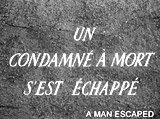
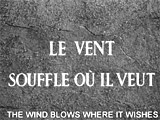
|
A Man Escaped - or: The Wind Bloweth
Where It Listeth (1956, Fr.) (aka Un Condamné à Mort
S'est échappé ou Le Vent Souffle où il Veut)
In Robert Bresson's dramatic, suspenseful, documentary-styled
wartime POW jailbreak-escape thriller - the effective story of intense
courage and perseverance was based on a true story about French Resistance
fighting member André Devigny
who was held in Fort Montluc prison at Lyon by the occupying German
Gestapo during WWII in 1943.
The entire methodical and unsensationalist film, a
perfect example of pure visual cinema, was told from the protagonist's
point of view mostly from within his claustrophobic cell. It featured
his sparse voice-over commentary to describe what he was thinking
and feeling. All of the violence (executions and beatings) in the
film occurred off-screen, as did many sounds from unseen, off-screen sources:
- during the title credits, the director wrote: "This
is a true story. I've told it as it happened, unadorned"; a memorial
plaque on the Montluc Prison wall stated: "HERE UNDER GERMAN OCCUPATION,
10,000 MEN SUFFERED UNDER THE HANDS OF THE NAZIS. 7,000 DIED"
- the film's setting was in Lyon, France (Nazi-occupied)
in the year 1943 during WWII
- in the stunning, suspenseful opening sequence,
seen without dialogue, condemned Nazi prisoner, French Resistance
fighter Lt. Fontaine (Francois Leterrier), made his first escape
attempt while he was being transported to the Lyon military prison
in the back seat of a vehicle next to the door and window; two
other handcuffed prisoners were next to him in the back seat; after
a closeup of a male prisoner's hands, the man was viewed eyeing
and touching the door handle with his left hand, he was able to
open it and jump from the slowing car when a streetcar crossed
the vehicle's path
- during the tense sequence, the camera remained stationary
and fixed inside the car, aimed at his now-empty seat; shortly
later, Lt. Fontaine was recaptured (off-screen, while
shots, scuffling and cries in German were heard - it was one instance
of the film's brilliant use of diegetic sound); he was
thrown back in the car, handcuffed to himself,
and brought to the prison
- with a blood-stained shirt, Fontaine arrived unconscious
on a stretcher at his prison cell; there was clear evidence
that he had been severely pistol-whipped and beaten off-screen
(with feet and fists) by German guards; he spoke to himself: "My
courage abandoned me for a moment, and I cried"; Fontaine was incarcerated
in solitary confinement in a claustrophobic, sparsely-furnished
small cell (3 x 2 meters) with a wooden-framed bed, mattress, and
two blankets; next to his bed was a sanitary slop pail, and on
the wall was a small shelf; the following morning after a
long sleep, he pretended to be weak to
fool the prison guards, and was left handcuffed to himself
- his cell had a high ceiling with a small, iron-barred
window where he could look out onto the lower courtyard, where he watched
a small group of other POWs taking an unsupervised daily stroll;
he learned from one of the Resistance prisoners named Terry (Roger
Treherne) that there was "a way" to communicate with the outside
world; during a morning wash-up, he was able to cleanse his facial
wounds
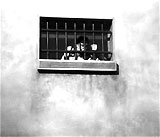
|

|
|
High, Small Cell Window Overlooking Lower Courtyard
|
- in voice-over, he described how he was able to tap
out alphabet letters on the wall, to compose messages in code to
his unseen 19 year-old neighboring cellmate, a bronze factory worker
who had been incarcerated for quarreling with and killing a German
- he rigged a way to receive small parcels through his
cell window from Terry in the courtyard through a lowered cloth sack;
after receiving paper and a pencil, he risked sending a written note
back down to Terry, to alert his superiors by mail that the post
transmitter he had used was aiding the Germans after they had cracked
the code
- Fontaine also requested a safety pin - used to unlock
his handcuffs: ("I felt a sudden sense of victory"); he also received
a razor blade and other items, wrapped in the sack parcel with the
word "COURAGE" scribed on it by a female
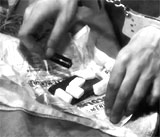
Contraband Items in a Cloth Sack
|
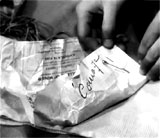
Parcel - with the Word "COURAGE"
|
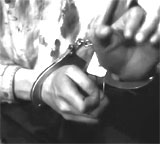
Pin Used to Unlock His Handcuffs
|
- for much of the film, he was imprisoned in unpredictable
and despairing circumstances, but refused to be resigned to his fate;
he struggled to endure and survive and overcome his oppressive condition; Lt.
Fontaine was brought to the prison office where he was forced to
promise that he wouldn't make another escape attempt; however, he
affirmed in voice-over: "As for me, I decided to escape as soon as
possible"; he had to be careful, however, since guards could observe
him through his cell's peep-hole
- to prepare for his escape, he studied the courtyard,
the walls, and the infirmary ("Unconsciously, I was getting ready");
he knew that executions were regularly taking place; the film often
used a passive camera to portray the Germans, who were often seen
as shadowy, undetailed characters, often leading prisoners around,
or often executing convicts (with most of the events outside the
cell remaining off-screen)
- then, unexpectedly after 15 days, he was suddenly transferred
from his first-floor cell to a different cell (# 107) on the top
floor, where he wasn't required to be shackled; on
this upper floor, he was more limited - he no longer had a communicative
neighboring cellmate (he attempted to tap on the wall, but there
was just silence), and could not use his upper-level window to pass
objects back and forth; his only contact with other prisoners
was during lavatory wash-ups
- in voice-over, he described
how only once a day, he was allowed to leave his cell to wash up and
empty his slop bucket: ("After emptying
our pails and washing our faces, we'd go back to our cells for another
24 hours. Nothing to do, no news, living in terrifying solitude,
we were a hundred or so awaiting our fate. I had no doubt about mine.
To escape, to flee"); his ultimate objective was to "escape"
- much of the film detailed the sequences
of Fontaine's painstaking, meticulous and patient planning for a
future escape from the stark prison - he completely deconstructed
his entire cell for purposes of creating makeshift tools for escape; he
whittled down his iron spoon into a sharp chisel tool, to loosen or
pry open the panel boards or strips of his poorly-made, oak cell door;
he spoke about "the constant fear of being caught"; after finding a
second spoon, he made more progress on the door but accidentally busted
the wooden frame, and had to spend time covering up the damage
- after a month of patiently working on the door, he
had disassembled a few of the panels to allow him to see out into
the hallway (but he put them back in place to camouflage it); he
had to be careful to prevent the door from being slammed - jarring
the loose boards
|
Fontaine's Preparations To Escape In His Cell
- Creating a Makeshift Tool To Pry Open Wood Panels on His Cell
Door
|
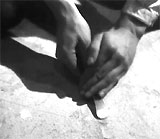
Whittling Down His Spoon to Use It as a Chisel to
Open Seams on Door
|
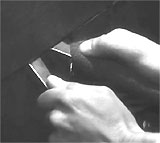
Prying Apart the Panels on the Wooden Door With Two Spoons
|
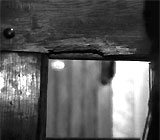
Removing Panels on the Wooden Door to See Out
|
- at one point, Fontaine spoke to Terry who mysteriously
stood outside his door and shared news that he was being released;
he also heard that his unseen downstairs cell-neighbor had been
shot two days earlier; he met a new arrival in the wash-room -
Pastor de Leyris (Roland Monod) who had been arrested at his church's
pulpit; he also learned the identity of his quiet, next-door neighbor
- elderly, weak, distraught and suicidal white-haired Blanchet
(Maurice Beerblock), who was fearful and knew he was doomed to
die for being found with hidden money; (it was entirely possible
that Fontaine's tapping on the wall prevented Blanchet from committing
suicide), eventually, Blanchet began whispering to Fontaine from
his cell window
- Fontaine was also introduced to a new prisoner named
Orsini (Jacques Ertaud) who lived across the hallway from Fontaine
(and helped to be a lookout and provide alerts); Orsini had been
betrayed and turned into the Nazis by his own wife
- late one night, Fontaine was able to briefly escape
from his cell through his deconstructed door, to enable him
to roam around at will in the corridor and survey the layout of
the prison for a future escape
- Orsini expressed his interest in partnering with
Fontaine in escaping; another night, Fontaine
exited through a skylight, and was able to learn the exit route
from the building and how to avoid the guards; Fontaine shared
with Orsini the exit route and how to dismantle his cell door,
then, Fontaine began to construct braided, wire-reinforced rope from materials
in his cell; he monotonously proceeded to take apart his bed, his
mattress and wire-netting/springs, and later, he also used pillow
cloth, other strips of ripped clothing and a blanket (tossed to
him by Blanchet) to make other lengths of braided rope; he said
to himself: "I was getting closer. The slightest mistake could be fatal"
- however, the anxious Orsini, who thought Fontaine's
plan was too lengthy and complicated, decided to escape on his
own; he unwisely attempted a prison escape in broad daylight during
slop-bucket disposal; he was caught after reaching the prison's
rooftop when his rope broke on the second compound wall; that evening
after being brought back to his cell, Orsini shared crucial information
with his across-the-hallway neighbor Fontaine about his failed
escape - he advised that Fontaine would need metal grappling hooks
for the ends of his ropes:
"You'll need hooks, Fontaine," to scale the walls; three
hooks (each with a wire loop) were to be built from the cell's
light (or lantern) fixture-frame
- the next day, Orsini was
executed by a firing squad (gunshots were heard off-screen), and
Fontaine observed that he was constantly on edge: "Can we be sure
of anything here?"; he realized time was running out when it was
announced that cells would be searched in 24 hours; other prisoners
were encouraged by Fontaine's plan to escape, while others warned
him: "Your plan is pure fantasy...Can you really go?"; Blanchet
was hopeful for him: "Have faith in your hooks and ropes, and in
yourself. You have doubts"; frozen in fear, Fontaine replied: "It's
hard to take the plunge"
- during a brief off-prison trip to the notorious
Hotel Terminus (Gestapo headquarters), Fontaine was informed that
his case was officially closed; he had been charged with treasonous
espionage and sabotage (a bombing of a bridge) against the Nazis
- both punishable by death, and was to be executed in a few
days now that the red tape surrounding his arrest had been cleared
up; upon his return to his cell, he dropped down on his bed - expressing
mixed emotions (laughing and/or crying)
- after he was returned to his cell, he was unexpectedly
joined by a young and filthy cellmate - 16
year-old, teenaged conscripted soldier who had deserted - François
Jost (Charles Le Clainche); during a long conversation with him,
the troubled Fontaine viewed Jost suspiciously and with uncertainty
(and regarded him as either a potentially untrustworthy spy and stool
pigeon, or as a partner); Fontaine attempted to decipher
whether he could work with Jost or not; it caused Fontaine to suffer
a severe dilemma - should Jost be trusted or not? -- "I had
no time to lose. I had to choose. Either I took him along or I killed
him. My heaviest hook would be a good weapon. But did I have it in
me to kill him in cold blood?" Fontaine
worried to himself: "Would I have to kill him?"
- with his forbidden pencil (punishable by death),
Fontaine wrote his final wishes on a piece of paper and passed
them onto the Pastor: "I wrote what I did, and still have
to do, to escape. Please make it known"; and then, he took
a chance on Jost escaping with him: "It's easier when you're
two....If you agree to help me, maybe we could..."; the kid
was shocked: "You
can't mean it. Have you seen these walls? And these bars? Fontaine,
use your head. Are you kidding?" - Fontaine responded with
dead seriousness: "No, I'm not...Everything is planned and
calculated...You won't regret it. I'll help you make the most of
your freedom";
he told Jost that he no longer had a "choice," now that
he saw one of his grappling hooks and knew of his escape plan -
fortunately, Jost agreed to join him
- in the film's final 20 minute sequence, the two
made a daring, tense, and determined escape attempt together in
the middle of a foggy and dark night - with only a limited amount
of time to succeed before sunrise; on the night of the escape, Blanchet
requested that Fontaine tap on the wall between them just before leaving;
Fontaine obliged the old man and received a gratifying tapped farewell
response (there had only been silence before)
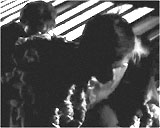
|
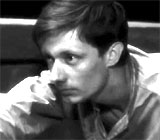
|
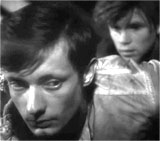
|
|
Early Moments of their Escape On the Prison's Rooftop
Before Looking Down into Courtyard
|
- the two escapees passed through the skylight
onto the rooftop (carrying the ropes attached to grappling hooks)
and were able to reach the edge of the roof overlooking the courtyard; the
tensest moment came at midnight when Fontaine realized that he must
silently kill the armed guard stationed in the courtyard; an hour passed
before he descended down the rope into the courtyard and timed the
murder (off-screen), with only his bare hands rather than with a hook,
to occur during the noisy whistling of a train passing by
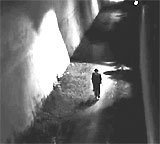
2nd Guard on Bicycle Between Inner and Outer Walls of the Prison
|

Looking Down at the Corridor Between the Two Walls
|
- then, the undetected prisoners climbed back up the
courtyard's wall of the prison compound and scurried along another
section of the rooftop; Fontaine looked over the edge and realized
that they had to bridge the gap between the inner and outer walls of the prison
compound, using the rope with a grappling hook; a second worrisome
problem was that a lone German guard was riding a squeaky bicycle between
the two walls around the circumference of the prison all night long;
their escape had to be perfectly timed
- at the end of the sequence after a very long
hesitating delay and a failure of nerve due to being fearful of getting
caught, signaled by a fade and the passage of time via clock bells
striking four (AM) ("Time was running out, so were our chances"), Fontaine
finally gathered up his courage and shimmied across the rope (that
held his weight) between the two walls, and dropped to the ground
outside the prison (into a back street in Lyon); Jost followed after him
- after tightly embracing each other on the other side
of the wall, and Jost murmured to Fontaine: "If my mother could
see me now," the
two POWs walked away from the prison, now freed, accompanied by a
chorus of the "Kyrie" from Mozart's Great Mass in C-Minor,
No.16
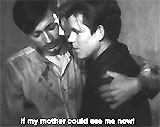
After Dropping to the Ground From the Outer Wall, Jost Exclaimed: "If my
mother could see me now!"
|

Their Successful Escape into the Darkness to Freedom
|
|



Lt. Fontaine Escaping from Moving Car - Camera Remained
Stationary Inside Car Viewing His Empty Seat, as He Was Recaptured
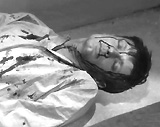

Deposited in Cell, Fontaine Had Been Severely Beaten
(off-screen)

Lowered Cloth Sack Used to Exchange Items With POWs
in Courtyard
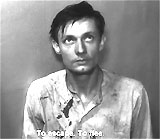
Fontaine's Goal: "To escape, to flee"
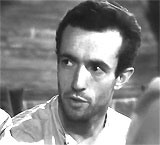
New Arrival: Pastor de Leyris (Roland Monod)
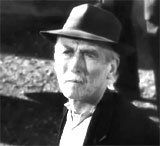
Quiet, Distressed, White-Haired Cell Neighbor: Blanchet (Maurice
Beerblock)
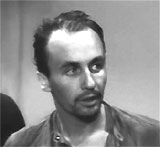
Orsini (Jacques Ertaud)
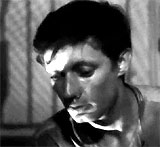
Fontaine Roaming Through the Prison's Corridor During a Brief Escape
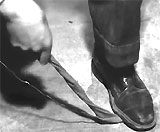
Twisting a Piece of Cloth

Fontaine's Construction of Braided, Wire-Reinforced
Rope
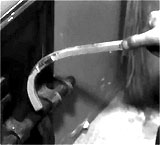
A Grappling Hook Made from Frame of Cell's Light Fixture Frame
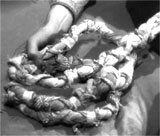
Braided Rope Made of Strips of Cloth
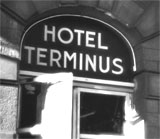
Hotel Terminus Interrogation
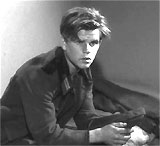


Arrival of Young Cellmate Yost - Was He Trustworthy
or Not?
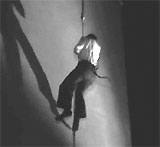
Fontaine Descended on Rope From Roof Into Courtyard
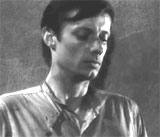
Waiting for the Right Moment to Kill the First Guard in the Courtyard
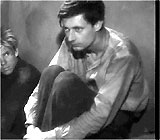
Fontaine Hesitating in Fear to Shimmy Across the Rope Extended Between the
Inner and Outer Walls
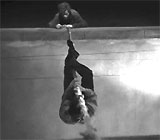
Fontaine Crossing on the Rope Between Walls
|

























